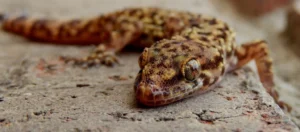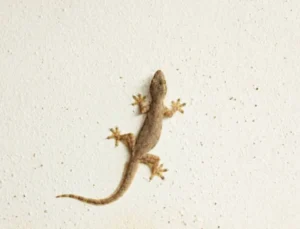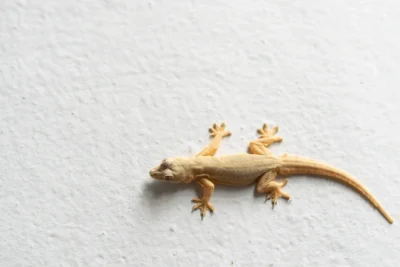This page answers the question on How to Get Rid of House Geckos. House geckos, while harmless, can become unwelcome guests in our homes. Their chirping noises and sudden appearances on walls can be unsettling.
If you’re looking for effective methods to manage their presence, you’ve come to the right place. In this comprehensive guide, we’ll explore various strategies and techniques to safely and efficiently eliminate house geckos from your living space.
From preventive measures to humane removal tactics, discover the steps to regain control of your home environment without harming these tiny reptilian visitors.
Understanding House Geckos

House geckos, often referred to as common house geckos or Mediterranean house geckos, are small reptiles belonging to the family Gekkonidae. Here are some key points to understand about them:
- Physical Characteristics: House geckos typically have a slender body, large eyes with vertical pupils, and adhesive toe pads that allow them to climb on vertical surfaces and even ceilings. They come in various colors, including shades of brown, gray, and sometimes green, with patterning that helps them blend into their surroundings.
- Habitat: As their name suggests, house geckos are commonly found in and around human habitation, particularly in warm regions. They are native to regions around the Mediterranean but have been introduced to many other parts of the world, often hitchhiking on goods or plants.
- Diet: These geckos are primarily insectivores, feeding on a variety of small insects such as ants, cockroaches, spiders, and moths. They are nocturnal hunters, relying on their excellent night vision to locate prey.
- Reproduction: House geckos are oviparous, meaning they lay eggs. They typically lay one or two eggs at a time, which are often hidden in crevices or under debris for protection. The eggs hatch after a few weeks, and the young geckos are independent from birth.
- Behavior: House geckos are nocturnal creatures, meaning they are most active during the night. During the day, they often hide in dark, secluded spots such as behind picture frames, in cracks in walls, or in electrical outlets. They are known for their distinctive chirping or clicking sounds, which are thought to be a form of communication.
- Benefits and Concerns: House geckos can be beneficial to have around homes and buildings as they help control insect populations, including pests like mosquitoes and cockroaches. However, some people may consider them a nuisance if they find their presence unsettling or if the geckos leave droppings around the house.
- Adaptations: Their ability to climb smooth surfaces and even move across ceilings is facilitated by specialized toe pads covered in microscopic structures called setae, which create an adhesive force known as van der Waals forces. This adaptation allows them to exploit a wide range of habitats and access prey that other animals might not be able to reach.
Overall, house geckos are fascinating creatures that have adapted well to living in close proximity to humans, providing pest control services while remaining relatively inconspicuous.
Common areas where they are found in the house
House geckos are commonly found in various areas within a house, especially in regions where they are prevalent. Some common areas where you might find house geckos include:
- Walls and Ceilings: House geckos are adept climbers and frequently inhabit vertical surfaces, including walls and ceilings. Their ability to walk upside down on ceilings using their adhesive toe pads allows them to access elevated areas where insects may be present.
- Window Sills: House geckos are often seen near windows, as these areas provide access to outdoor environments where insects are abundant. They may hide in the corners of window frames or behind curtains during the day and become more active at night.
- Door Frames and Entryways: Geckos may be found near door frames and entry points to the house, as these areas offer easy access to both indoor and outdoor environments. They may hide in cracks or crevices around door frames or under door thresholds.
- Light Fixtures: House geckos are attracted to light sources, which can attract insects for them to feed on. They may hide around light fixtures or electrical outlets during the day and emerge at night to hunt.
- Bathroom and Kitchen Areas: These areas often provide moisture and warmth, which can attract insects and create favorable conditions for house geckos. They may hide in cabinets, behind appliances, or around plumbing fixtures.
- Outdoor Structures: In addition to the interior of the house, house geckos may also be found in outdoor structures such as sheds, garages, or patio areas. These areas offer shelter and access to prey, making them attractive habitats for geckos.
- Plants and Vegetation: House geckos may also be found in gardens or indoor plants, as these areas provide shelter and potential food sources. They may hide among foliage or in plant pots during the day.
Overall, house geckos are adaptable creatures that can thrive in a variety of indoor and outdoor environments, making them commonly encountered in and around human habitation.
Reasons to Get Rid of House Geckos
While house geckos can be beneficial in controlling insect populations, there are some reasons why someone might want to get rid of them:
- Fear or Discomfort: Some people may have a fear of reptiles or find the presence of geckos unsettling, especially if they are not familiar with them or if they perceive them as a potential threat.
- Mess and Droppings: House geckos can leave droppings around the house, particularly in areas where they frequent. While these droppings are generally small and dry, they can still be unsightly and may require regular cleaning.
- Noise: House geckos are known for their distinctive chirping or clicking sounds, especially during the mating season or when they feel threatened. These sounds can be bothersome to some people, particularly if they occur frequently or at night when trying to sleep.
- Potential Damage: While house geckos themselves are not typically destructive, their presence could attract other pests or predators that may cause damage to property or pose a threat to human health. Additionally, geckos may inadvertently cause damage if they become trapped in electrical fixtures or appliances.
- Hygiene Concerns: Although house geckos primarily feed on insects, they may occasionally scavenge on food scraps or other organic matter. In some cases, their presence near food preparation areas or in storage areas could raise hygiene concerns, particularly if they come into contact with food items or kitchen utensils.
- Allergies or Asthma: While uncommon, some individuals may have allergies or respiratory issues triggered by exposure to gecko droppings or shed skin particles. In such cases, removing geckos from the living environment may be necessary to alleviate symptoms.
- Regulatory Compliance: In certain situations, such as commercial food establishments or rental properties, there may be regulations or guidelines regarding pest control that necessitate the removal of geckos if their presence is deemed undesirable.
It’s essential to weigh these factors against the potential benefits of having house geckos around, such as natural pest control, before deciding to take measures to get rid of them. If removal is deemed necessary, it’s advisable to employ humane and environmentally friendly methods that do not harm the geckos or other wildlife.
Natural Ways to Deter House Geckos

If you’re looking to deter house geckos from your home using natural methods, here are some strategies you can try:
- Remove Food Sources: Since house geckos primarily feed on insects, reducing the presence of their prey can help deter them. Keep your home clean and free of crumbs, food spills, and standing water to discourage insects from congregating.
- Seal Entry Points: Inspect your home for any cracks, gaps, or openings that house geckos could use to enter. Seal these entry points with caulk or weatherstripping to prevent geckos from gaining access to your home.
- Declutter and Remove Hiding Spots: Clear clutter from around your home, both indoors and outdoors, to eliminate hiding spots for house geckos. Trim back vegetation and remove debris from the perimeter of your home to reduce potential habitats.
- Natural Repellents: Some natural substances, such as garlic, onion, or chili pepper, are believed to have repellent properties against house geckos. You can create a solution by mixing these ingredients with water and spraying it around entry points, windowsills, and other areas where geckos are present. However, keep in mind that the effectiveness of these repellents may vary, and they may need to be reapplied regularly.
- Ultrasonic Devices: There are ultrasonic devices available on the market that emit high-frequency sound waves that are unpleasant to house geckos and other pests. These devices are typically safe for humans and pets but may not be effective in all situations.
- Lighting: House geckos are attracted to light sources, as they help attract insects for them to feed on. Consider using yellow or sodium vapor outdoor lights instead of white lights, as they are less attractive to insects and, consequently, to geckos.
- Natural Predators: Introducing natural predators of house geckos, such as certain species of birds or larger reptiles, may help control their populations. However, this approach should be carefully considered, as introducing non-native species can have unintended consequences and may not be feasible in all situations.
- Preventive Maintenance: Regularly inspect your home for signs of gecko activity and take proactive measures to deter them before they become established. This could include periodically resealing entry points, maintaining a tidy environment, and addressing any issues with moisture or humidity that could attract geckos.
Remember that while natural methods can be effective in deterring house geckos, they may not provide complete elimination, especially if the geckos have already established a presence in your home. In such cases, you may need to consider professional pest control services for more comprehensive solutions.
Chemical Methods for Elimination
While natural methods are preferred for deterring house geckos due to their non-toxic nature, there are chemical methods available for elimination if necessary. Here are some chemical options commonly used for controlling house gecko populations:
- Insecticides: Insecticides can be used to target the primary food source of house geckos, which are insects. Spraying insecticides around the perimeter of your home, especially in areas where geckos are frequently seen, can help reduce the insect population and indirectly discourage geckos from sticking around. However, be cautious when using insecticides, especially indoors, and follow the manufacturer’s instructions carefully to minimize risks to humans and pets.
- Repellents: There are commercial reptile repellents available that contain chemical compounds designed to deter geckos from entering certain areas. These repellents may emit odors or tastes that are unpleasant to geckos, encouraging them to avoid treated areas. However, the effectiveness of repellents can vary, and some may contain ingredients that are not suitable for use indoors or around pets.
- Glue Traps: Glue traps are another option for capturing and eliminating house geckos. These traps typically consist of a sticky adhesive surface that traps geckos when they come into contact with it. While glue traps can be effective, they may not be considered humane by some people, as they can cause distress and injury to the trapped geckos. If using glue traps, be sure to check them regularly and release any captured geckos safely.
- Desiccants: Desiccants are substances that absorb moisture from the environment, and some desiccants are marketed for controlling pests like house geckos. These products are typically applied in powder form to areas where geckos are active, such as cracks and crevices, and work by dehydrating the geckos. However, desiccants may not be suitable for use in all environments, especially if there are concerns about human or pet exposure.
- Professional Pest Control Services: If chemical methods are necessary, it’s recommended to seek the assistance of professional pest control services. Pest control professionals can assess the extent of the gecko infestation, recommend appropriate treatment options, and apply chemical products safely and effectively. They can also provide guidance on preventive measures to help deter future infestations.
When using chemical methods for eliminating house geckos, it’s important to prioritize safety and minimize risks to humans, pets, and the environment. Always read and follow the instructions provided by the manufacturer or pest control professional, and consider non-chemical alternatives whenever possible.
Prevention Tips to Keep Geckos Away
Preventing geckos from entering your home in the first place is often more effective than trying to remove them once they’ve established a presence. Here are some prevention tips to help keep geckos away:
- Seal Entry Points: Inspect the exterior of your home for any cracks, gaps, or openings that geckos could use to enter. Seal these entry points with caulk, weatherstripping, or other appropriate materials to prevent geckos from gaining access.
- Install Screens: Ensure that all doors, windows, and vents are equipped with tight-fitting screens to prevent geckos from entering your home while still allowing for ventilation. Repair or replace any damaged screens to maintain their effectiveness.
- Trim Vegetation: Keep vegetation, shrubs, and trees trimmed back from the exterior of your home to reduce hiding spots and potential pathways for geckos to access your house. This also helps minimize the presence of insects near your home, which are a primary food source for geckos.
- Reduce Outdoor Lighting: House geckos are attracted to light sources, so consider reducing outdoor lighting or using yellow or sodium vapor lights that are less attractive to insects and, consequently, to geckos.
- Remove Debris: Clear clutter, leaf litter, and debris from around your home, as these materials can provide hiding spots and habitat for geckos and their prey. Keep outdoor areas clean and well-maintained to discourage geckos from congregating near your home.
- Limit Moisture: House geckos are attracted to areas with moisture, so minimize excess moisture around your home by fixing leaky pipes, clearing clogged gutters, and ensuring proper drainage. This can help deter geckos and other pests that thrive in humid environments.
- Store Firewood and Outdoor Items Properly: Store firewood, lumber, and other outdoor items away from the exterior of your home and off the ground to reduce potential hiding spots for geckos and their prey.
- Practice Good Hygiene: Keep your home clean and free of food crumbs, spills, and other organic matter that can attract insects and, subsequently, geckos. Regularly clean and vacuum indoor areas to remove potential food sources and hiding spots.
- Use Natural Deterrents: Consider using natural repellents such as garlic, onion, or chili pepper sprays around entry points, windows, and other areas where geckos are present. While their effectiveness may vary, these natural deterrents can help discourage geckos from entering your home.
By implementing these prevention tips, you can help minimize the likelihood of geckos taking up residence in your home and reduce the need for more intensive control measures.
Conclusion
To effectively get rid of house geckos, it’s important to employ a combination of prevention and humane removal methods. Sealing off entry points, keeping the house clean, and reducing insect populations can discourage geckos from entering.
Additionally, using repellents like garlic or mothballs may deter them. However, if geckos persist, it’s best to contact pest control professionals for safe and efficient removal without harming the geckos or disrupting the ecosystem. Remember, humane methods ensure a balanced environment while addressing the issue effectively.

